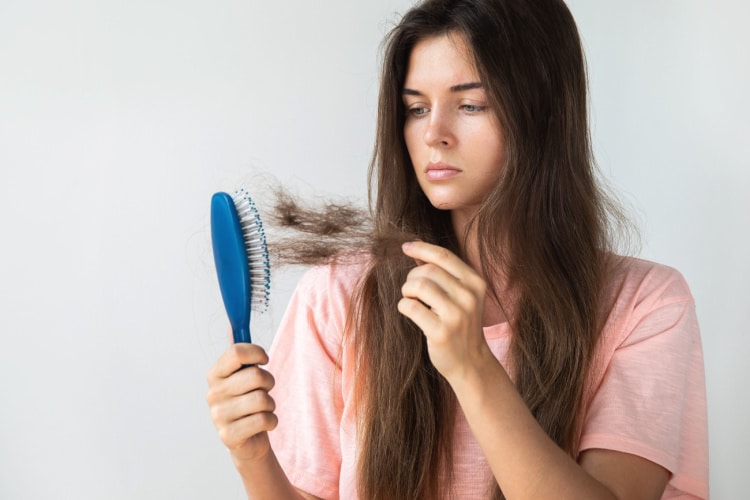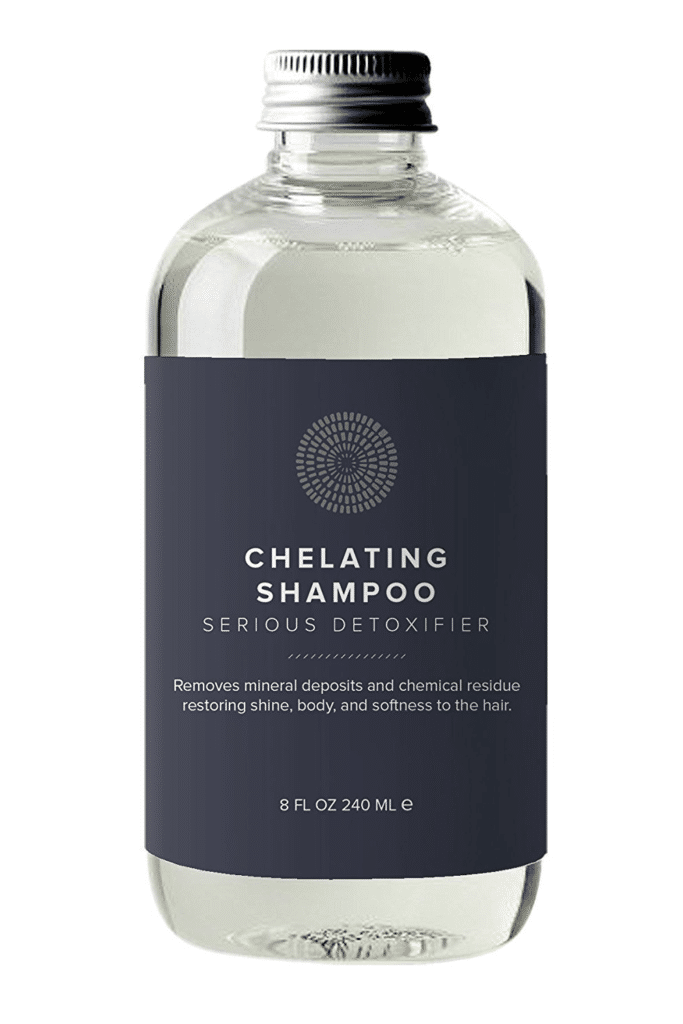Do you ever look in the mirror and wonder why your once luscious locks have turned limp and lifeless? Even after trying many different solutions and expensive hair loss products, your hair keeps getting thinner.
You might be surprised to learn that the answer might not be in your shampoo bottle but in your shower head! Yes, the often overlooked culprit of hair loss is hard water.
While this does not mean that hard water will always lead to hair loss, the high levels of minerals in hard water can build up on the hair and scalp, leading to damage. With time, this can lead to hair loss or speed up hair loss, especially in people with sensitive skin and a genetic predisposition to hair loss.
In this article, we’ll take a closer look at the effects of hard water on hair, explain how hard water damages hair, and explore what you can do to protect your hair and ensure it retains its vibrant and voluminous look.

What Causes Hair Loss?
The two biggest reasons for hair loss are age and genetics. Unfortunately, the latter is honestly just a blind throw of the dice, and you only find out how it landed when you reach your mid to late twenties.
That said, both of these factors are gradual, slow-progressing, and happen in predictable patterns. This means that genetics and age are probably not to blame if you suddenly start seeing clumps of hair on your shower floor.
Hormonal changes, stress, unhealthy diet, vitamin deficiencies, and environmental factors, such as hard water, are more likely to be the culprit in these cases.
Nevertheless, with so many different things that could affect the hair growth cycle, it’s tough to pinpoint the exact cause of your hair loss. This becomes an even bigger challenge when we consider the fact that sometimes hair loss is a result of multiple factors, such as genetics, stress, poor diet, and on top of all that – hard water.
Does this mean that you can never really find out whether hard water is to blame for your hair loss?
No, not at all. Fortunately, hair loss due to hard water is one factor that’s fully in your control. But to find out if that’s the reason for your thinner hair, you need to understand the extent of the effects of hard water on hair and what you can do to stop and reverse those effects.
Hard Water and Hair Loss
Genetics, hormonal changes, and certain medical conditions can directly cause hair loss by changing the hair follicles’ receptivity and reactivity to androgen hormones. This causes hair follicles to produce fewer and thinner hairs.
Hard water, on the other hand, does not have this kind of power – its effects on hair are more indirect.
This means that the high mineral content in hard water, especially calcium and magnesium, can irritate and dry out your scalp, make air products less effective, and leave mineral residue on your scalp. With time, this creates unsuitable conditions for hair growth leading to damage. Hair loss might be more pronounced and noticeable if you also have a genetic predisposition to it or have more sensitive skin.
Let’s explore this in greater detail.
Effects of Hard Water on Hair

As we’ve established, hard water contains large amounts of calcium and magnesium minerals. Depending on where you live, the concentration of these minerals in your water can be low (soft water), moderate, high, or extremely high (very hard water).
If you live in areas with extremely hard water, you have probably noticed stains on your glassware, sinks, and toilet bowls. These stains are a result of residual mineral deposits.
When it comes to your hair and skin, these mineral deposits can:
- Dry out and irritate the scalp
- Build up on top of the scalp and around hair roots. This weighs down the hair and makes it look dull, lifeless, and less vibrant.
- Clog hair follicles, preventing hair from growing
- Damage hair fibers, leading to breakage
- Cause color-treated hair to fade faster
- Prevent hair care products from penetrating the hair shaft
Still, the two major ways in which hard water contributes to hair loss are hair follicle blockage and the fact it weighs down hairs due to mineral buildup.
Mineral build-up happens mostly because hard water makes shampoos and conditioners less effective and reduces their ability to lather and sud.
Since lathering becomes more difficult, the hair essentially gets coated in a layer of soap or shampoo that can’t be washed off easily.
Therefore, not only do shampoos and soaps fail to thoroughly clean your scalp from dead skin cells, but they also leave product residue, which forms a sort of film over the hairs and prevents any moisture from reaching the follicles and the skin.
Putting too much force into lathering up your hair might also lead to irritation and damage to your scalp, as well as loose or broken hairs. If the follicles are put under this much stress for a long period of time and don’t receive enough moisture, then they start to break or fall off.
The only way to break this cycle and thoroughly wash your hair is to use soft water. But, will that reverse the damage that was already done? Let’s find out.
Is Hair Loss Due to Hard Water Irreversible?
No, it isn’t. Hair loss due to hard water is definitely not irreversible, but it may take some time and effort to reverse the damage caused by the minerals in the water.
The first step is to break the cycle and stop washing your hair with hard water. Then, start nourishing your hair with gentle treatments and high-quality hair products. With proper care, it’s possible to reduce the damage caused by hard water and promote healthier hair growth, but you need to be patient to achieve the desired results.
In the next section, we’ll break down some of the best temporary and permanent solutions for hair damaged by hard water.
But, before we do that, we should remind you that other factors might also be responsible for your hair loss. If your hair loss is caused by an underlying condition, such as genetic hair loss, or a medical condition like alopecia, then addressing hard water may not reverse the hair loss.
It’s always a good idea to consult with a healthcare professional or a trichologist to rule out any underlying conditions.
The Solution to Hair Damaged by Hard Water

One of the most important things you can do to address the mineral build-up on your hair and scalp is to use the right hair products that have the ability to prevent or reduce the negative effects of hard water.
One such type of product is a chelating shampoo, which is specifically designed to remove mineral build-up. The word “chelating” comes from the word “chelate,” which means to bind or neutralize minerals. These products contain chelating agents that bind to the minerals in hard water, making them very easy to rise away.
Additionally, it’s important to use a deep conditioner or hair mask regularly to add moisture and nourishment to your hair. However, it’s probably best to use distilled or purified water when using conditioners and hair masks to make sure they remain effective.
You can buy purified water from any supermarket or local store, but this solution can be very expensive in the long run. On the other hand, using distilled water (boiled water) won’t cost you money but will take a lot of time and effort.
Therefore, all these solutions are temporary or short-term. If you live in an area with hard water, you need to think for the long run if you want to prevent hair loss due to hard water. One permanent solution is to install a water softener.
How to Prevent It From Happening Again
Installing a water softener can greatly reduce the negative effects of hard water on the hair and scalp, leaving hair looking healthier, shinier, and more manageable. And, while it’s a big investment, it’s more than worth it if you want to neutralize these effects for good.
These devices use the ion exchange method to change the mineral ions in hard water with sodium ions. This softens the water and allows you to lather and rinse out the cleaning products much more easily. Check out our guide on the best water softeners on the market to learn more.
To improve the health of your scalp, use the recommended hair care products and ensure the water you use does not dry out your skin. Your hair and scalp will thank you for it.